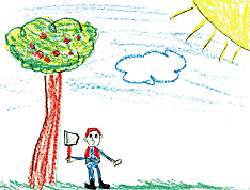Seeing History
LoreSome elements of tradition are not fixed as texts. They have no literary form. They are just information. The ancient Chinese petty rulers Bwo-yi and Shu-chi starved rather than serve the Jou. Lincoln studied by firelight in a log cabin. Yi Yin was called from a position as cook to be instead the chancellor. If you are asked, Where did you get this, the answer must be, no one special place. If you are asked: Can you recite the story for me, the answer must be, No, I just know that it happened.
The most insidious form of lore is the tale that everybody knows. This fact does not argue for the genuineness of the tale, but rather for its popularity. It proves that the tale agrees with popular taste. Was it composed precisely in order to agree with popular taste? Such, at any rate, was the case with Washington and the Cherry Tree, the one picture of Washington that every first-grade student is prepared to draw, and having drawn, is prepared to relate to. But it does not occur in the earliest accounts of Washington. It was first told in a popular biography by one Parson Weems, a biography written precisely for the edification of children, and tailored to the understanding of children. The Weems biography is a perfect example of how a tradition shapes its memories to its desires, and creates new memories if the old ones do not sufficiently relate to its desires.
Children do not read the Parson Weems biography, they get the tale in a more general form from their teachers, from older students, from somewhere, just by contact with a culture in which that tale is now well established; part of the wallpaper. This is the form in which much of tradition gets passed on. To distinguish it from oral literature proper, we may call it lore: things one knows just by being a member of a social or occupational group. Some lore is folklore; the examples above are from elite lore.
Oral Literature
Sometimes a late text may contain earlier material. How did it get there? A too frequent device of the believing investigator, when pressed by this question, is to pronounce the word "oral." Meaning, presumably, that the information before us was passed down in unwritten form before being reduced to writing. This is a too convenient way of avoiding the implications of the dates of texts. Exact oral transmission is almost a contradiction in terms; the notion of text fixity tends to arise with written cultures, and is not characteristic of oral cultures in the strict sense (that is, of cultures not possessing writing). With oral cultures in the mixed sense, meaning all the rest of us, it is a common observation of those who observe at all, that the existence of writing tends to weaken the power of memory. This argues against exact oral transmission.
Are not such things as folktales relatively fixed? Let those who have spent a summer recording the different variations of the traditional Upper Chehalis tale "The Wren and His Grandmother" from the lips of the last living member of that tribe report the answer, or rather the multiplicity of answers, while the armchair oral theorists listen quietly. Are not the tunes of Japanese court music, memorized note by note in youth, and passed from father to son over a thousand years, completely safe from variation? Well, as it happens, we can actually compare the written scores of a thousand years ago (which the musicians know about but do not use). What we find out when we make that comparison is that the wind parts, which were the province of the professionals (wind instruments are harder to play) are recognizable, though not exact. But the string parts (often taken on by court amateurs in early days) have been almost wholly replaced by chordal faking, the elaborate throughcomposed original being simply lost.
Oral transmission is thus possible, but it is not an easy hypothesis. It needs to be shown how, and especially why, that culture put forth the considerable effort needed to accomplish that end.
Rumor
We can observe the creation and spread of tales in our own time, and it is good for the careful historian to either make such observations, or to listen to those who have taken the trouble. Here is Marc Bloch, speaking from his experiences in the French Army in World War One:
Rumors did not ordinarily originate on the firing line. There, the little groups were too isolated from one another. The soldier could not move about except under orders; most frequently, at the risk of his life. Occasionally, intermittent travelers went the rounds: liaison officers, artillery observers, telephone communications men repairing their lines. These notable personages scarcely associated with the common soldier. But there were regular communications of far greater importance, made necessary by the demand for sustenance. The agorae of this little world of dugouts and observations posts were the field kitchens. There, once or twice a day, the carriers from the various points of the sector came together and chatted amongst themselves or with the cooks. The latter knew a great deal, for, situated on the crossroads of all units, they had the further and unusual privilege of exchanging a few words with the drivers of the regimental service corps, fortunate men who were quartered in the vicinity of staff headquarters. Thus, for a moment, around fires in the open air or the grates of the field kitchens, there were momentary contacts among very dissimilar groups. Then the fatigue parties, moving off by the trails and communication trenches, brought to the most forward parts of the front, along with their camp kettles, this mass of intelligence true or false, almost always distorted in every detail, and ready for further elaboration there. On the tactical maps, a little behind those interlacing lines which designate the forward positions, it would be possible to hatch in a continuous strip which would be the myth-making zone. (The Historian's Craft, 108-109)
Chinese Antiquity
We now return to the question of lore, with an example from classical China. Here as elsewhere, a theory of lore transmission will in many cases fill the gap between an intrinsically implausible "oral transmission" and an unattested written transmission. The typical lore module in classical China is a tale, or more commonly a fact not worked up into a tale, which is learned by new members of the ruling elite simply by hanging around the older members of that elite. Such facts or tales are not acquired by memorization, they are not danced around a campfire or intoned at a sacrifice; they are picked up casually. They do not exist in the minds of those who possess them in a precise literary form. They are just information.
And that information, as has been shown by monitoring samples of it over several centuries, is as subject to change as anything else. This agrees with the results of similar studies of Greek tradition. It agrees with what we can see people doing at the present time. A tale in my family told of an ancestress whose children had died because of a prescription mistake made by her pharmacist husband, who himself died from grief shortly afterward. My father once spent weeks in Michigan digging into contemporary records in an effort to verify the tale. The tale more or less dissolved in the process. But it was a satisfyingly monumental tale while it lasted; our personal family epic.
Epics are very functional in context. They gratify the minds of those who possess them; they confer stature on the family (or the culture), and on all who see themselves as members of the family (or the culture). It merely needs to be recognized that in the process of fulfilling that function, the epics may drift very far from any factual core which they may once have possessed. No man can serve two masters, we are told, and no bit of information can simultaneously serve the past and the present. An item of lore is a bit of information attempting to do both. Let the reader, or the hearer, beware.
Readings
- Marc Bloch. The Historian's Craft. A legitimate descendant of Langlois et Seignobos (Bloch was a student of Seignobos). The uncompleted French original, published from Bloch's notes after WW2, has recently been resissued by the author's son
- Melville Jacobs. The Content and Style of an Oral Literature
- Walter J Ong. Orality and Literacy. The Bible of the subject, often quoted by both sides in an argument. Requires, but repays, an honest and unprejudiced reading
- Rosalind Thomas. Oral Tradition and the Written Record in Classical Athens
- A Taeko Brooks. The Lu Lore Tradition. Locus of the "lore" concept. This basic study, which refers to Rosalind Thomas's parallel Greek results, shows that the content of an elite Chinese lore tradition about political figures of the past tended to evolve over time, and that neither its range of inclusion, nor its attribution of virtues, nor its envisioning of official duties, were proof against corruption from the standards and organizational structure of the time
17 Dec 2006 / Contact The Project / Exit to Outline Index Page


